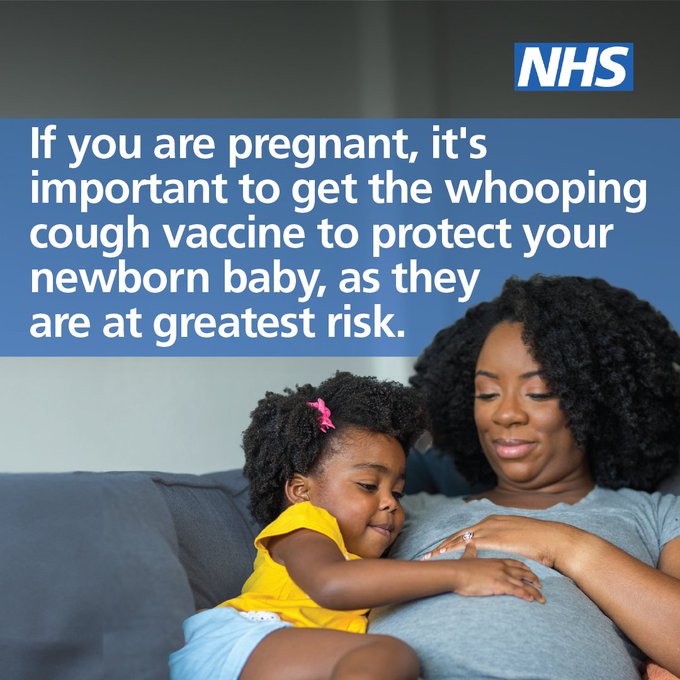New data published today by the UK Health Security Agency (UKHSA) shows cases of whooping cough continue to increase with 1,319 cases confirmed in March. This follows 556 cases in January and 918 in February, bringing the total number of cases in 2024 to 2,793.
Sadly, in the first quarter of 2024 (January – March), there have been five infant deaths. Young infants are at highest risk of severe complications and death from whooping cough. Updated estimates of vaccine effectiveness in pregnancy shows high levels of protection (92%) against infant death.
NHS National Medical Director, Professor Sir Stephen Powis, said:
“Whooping cough, clinically known as pertussis, is a bacterial infection which affects the lungs. The first signs of infection are similar to a cold, such as a runny nose and sore throat, but after about a week, the infection can develop into coughing bouts that last for a few minutes and are typically worse at night. Young babies may also make a distinctive ‘whoop’ or have difficulty breathing after a bout of coughing, though not all babies make this noise which means whooping cough can be hard to recognise.”
“With cases of whooping cough continuing to rise sharply across the country, and today’s figures sadly showing five infant deaths, it is vital that families come forward to get the protection they need.
““If you are pregnant and have not been vaccinated yet, or your child is not up-to-date with whooping cough or other routine vaccinations, please contact your GP as soon as possible, and if you or your child show symptoms ask for an urgent GP appointment or get help from NHS 111.”
Dr Gayatri Amirthalingam, Consultant Epidemiologist at UK Health Security Agency, said:
“Vaccination remains the best defence against whooping cough and it is vital that pregnant women and young infants receive their vaccines at the right time.”
“Pregnant women are offered a whooping cough vaccine in every pregnancy, ideally between 20 and 32 weeks. This passes protection to their baby in the womb so that they are protected from birth in the first months of their life when they are most vulnerable and before they can receive their own vaccines.”
“All babies are given three doses of the 6 in 1 jab at 8, 12 and 16 weeks of age to protect against whooping cough and other serious diseases such as diphtheria and polio with a pre-school booster offered at 3 years 4 months.”
“Whooping cough can affect people of all ages but for very young babies it can be extremely serious. Our thoughts and condolences are with those families who have so tragically lost their baby.”
Check if you or your child has whooping cough
The first signs of whooping cough are similar to a cold, such as a runny nose and sore throat (a high temperature is uncommon).
After about a week, you or your child:
- will get coughing bouts that last for a few minutes and are worse at night
- may make a “whoop” sound – a gasp for breath between coughs (young babies and some adults may not “whoop”)
- may have difficulty breathing after a coughing bout and may turn blue or grey (young infants)
- may bring up a thick mucus, which can make you vomit
- may become very red in the face (more common in adults)
The cough may last for several weeks or months.
Urgent advice: Ask for an urgent GP appointment or get help from NHS 111 if:
- your baby is under 6 months old and has symptoms of whooping cough
- you or your child have a very bad cough that is getting worse
- you’ve been in contact with someone with whooping cough and you’re pregnant
- you or your child has been in contact with someone with whooping cough and have a weakened immune system
Whooping cough can spread very easily. It’s best to call the GP before you go in. They might suggest talking over the phone.
Whooping cough can be dangerous
Babies under 6 months old with whooping cough have an increased chance of having problems such as:
- dehydration
- breathing difficulties
- pneumonia
- seizures (fits)
Whooping cough is less severe in older children and adults but coughing may cause problems including:
- sore ribs
- hernia
- middle ear infections
- pee leaking out when you cough (urinary incontinence)
Immediate action required:Call 999 or go to A&E if:
- your or your child’s lips, tongue, face or skin suddenly turn blue or grey (on black or brown skin this may be easier to see on the palms of the hands or the soles of the feet)
- you or your child are finding it hard to breathe properly (shallow breathing)
- you or your child have chest pain that’s worse when breathing or coughing – this could be a sign of pneumonia
- your child is having seizures (fits)
The whooping cough vaccine
The whooping cough vaccine protects babies and children from getting whooping cough. That’s why it’s important to have all the routine NHS vaccinations.
The whooping cough vaccine is routinely given as part of the:
- 6-in-1 vaccine – for babies at 8, 12 and 16 weeks
- 4-in-1 pre-school booster – for children aged 3 years 4 months
If you’re pregnant you should also have the whooping cough vaccine – ideally between 16 and 32 weeks.
Find out more about the whooping cough vaccination in pregnancy



